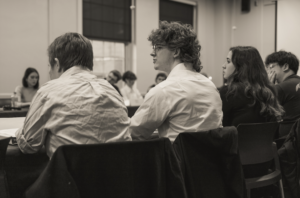Across the United States and within the University of Maine System (UMS), scholarship displacement is a common concern for students and donors. There is a lack of transparency in the process of wholly or partially subsidizing financial aid using funds granted by private scholarship providers.
A college or university may reduce the amount of financial aid provided by its institution when students are awarded outside funds. California, Maryland, Minnesota, New Jersey, Pennsylvania and Washington passed legislation to prohibit or limit scholarship displacement.
The School of Forest Resources (SFR) receives the most endowments toward scholarships at UMaine, which often serves as a drawing factor for prospective students. An anonymous third-year student in the Forestry Department expressed frustration shared among their peers and faculty members because the purposes behind SFR-related donations are fixed, yet donor expectations are not being adhered to.
“A lot of the donors are significantly opposed to the way the University of Maine runs as a business first and an academic system second. These donors understand that the SFR supports their students and that is their primary goal,” the anonymous student said. “Donors are more than happy to provide financial support, job support, offer internships, all these different things to continue the success of that department.”
Every March, there is an opportunity to apply for outside grants, which begin the following semester and are split to cover the academic year. Forestry students provide donors with a brief essay to lay out plans for the funding and explain how it contributes to their professional goals. A committee of SFR faculty, staff and donors decides who should be awarded the money toward the end of the month. In April, there is a luncheon for donors to network with the chosen students and celebrate their accomplishments.
The money granted is technically allocated toward student fees. For students enrolled in SFR affiliated programs as recent as fall 2023 who receive merit aid, it is not additional to the scholarship provided by UMaine but rather replaces it. Those enrolled before fall 2023 are grandfathered in and will continue to receive grants on top of their predetermined scholarships. Some prospective students who fall under the new precedent remain uninformed about its terms.
Hypothetically, if a new student is promised $20,000 in aid from UMaine and later selected by an SFR alumni to receive a $5,000 grant, their merit scholarship reduces to $15,000. The $5000 is replaced by SFR funds, allowing the original total to remain. In that sense, the University is still fulfilling its commitment to cut $20,000 from tuition. But where exactly does the $5,000 earned by the student go? While a written check is issued for the student, the money is indirectly distributed toward unknown funding initiatives.
There is speculation in terms of whether or not donors are made aware that the money given to specific students does not, in any way, enhance their academic aspirations. According to the UMaine webpage, donation recipients are expected to demonstrate gratitude for funding that essentially disappears.
“Many donors appreciate hearing directly from the students who benefit from their scholarships. This communication helps donors understand the positive impact of their generosity. As a result, we ask all scholarship recipients to write a letter of appreciation upon request,” the UMaine webpage states.
While it is an honor to be chosen as a recipient, how can students properly thank the individuals who provide additional support when the finances are not accessible to them? There is no clarity regarding where the money removed from UMaine scholarships is allocated.
“Scholarship amounts are a financial commitment made to students by the University of Maine. Some or all of the commitment funds may be replaced on the financial aid offered by other Federal, University, and Endowed scholarships and/or grants,” states the 2024 to 2025 academic year terms and conditions page.
Many believe students who earn additional scholarships should have financial freedom in terms of how the money is spent, so long as it aligns with the intent of corresponding private scholarship providers.
The anonymous student commends SFR staff for advocating on behalf of students while also considering their roles and those of stakeholders. There is unease about potential pushback from the UMS due to the lucrative nature of its subsidization process.
Moreover, the student claims some faculty members are concerned about threats to their positions but hope to solve the problem with administration directly. Despite having no control over scholarship subsidization, the responsibility to break the news to research partners falls on faculty, putting them in a difficult middleman position.
“It’s going to slowly start coming out. I think that faculty members are very careful but also very transparent about the way they are curating that narrative and what they’re telling to students,” said the anonymous student. “They want to be honest but also don’t want to cause panic. One of the big things they do have to consider is relationship with donors.”
SFR scholarship applications closed on March 29. The donor luncheon (invite-only) on April 5 will function as more of an open conversation. Students have an opportunity to speak on how scholarship displacement has impacted them and hear the perspective of donors.
The anonymous forestry student insisted that action must be taken at a legislative level because the UMS is neither transparent nor accessible, and that an outside body should assess the situation objectively.
“Education should not be transactional to this degree, and that’s the problem we’re facing. It’s incredibly disappointing to see it,” the student said.
The UMaine Board of Trustees (BoT) responded to the concerns in an official statement.
“Merit scholarships and institutional grants are a financial commitment to students by the University of Maine and may be funded by other UMaine scholarships. Scholarships are made possible through the gifts of UMaine friends and alumni who have chosen to generously share their resources with the university and our students,” said the BoT. “We always honor donors’ intentions to support our students’ goals by ensuring all foundation and donor awards comply with donor wishes as stated in the scholarship criteria.”


